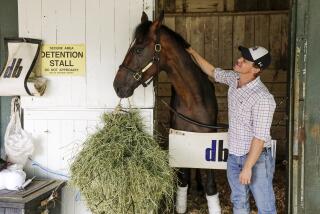To leading Canadian trainer, Lasix ban makes no horse sense
He wasn’t exactly Peter Finch in the 1976 movie “Network,” telling the world he was “mad as hell and not going to take it anymore!” But thoroughbred trainer Mark Casse wasn’t a happy camper Thursday.
Casse, 51, one of Canada’s leading trainers, with just shy of 90 wins this meeting at Toronto’s Woodbine track and five entries in this weekend’s Breeders’ Cup at Santa Anita, used terms such as “frustrated” and “disappointed.”
The topic was the banned use of the drug Lasix for all of the 2-year-old races in this year’s Breeders’ Cup. Three of Casse’s entries are in juvenile races. Lasix is used by most trainers to prevent their horses from bleeding through the nostrils during racing. If nothing changes, all horses — not just the 2-year-olds — will be mandated to run without Lasix in next year’s Breeders’ Cup.
This is a flash-point issue in racing. The grumbling has been there. No less than leading trainer Bob Baffert has said several times, more in disgust than jest about the new rules, that if the Lasix ban remains, he will advise his owners to stop buying horses.
But the grumbling previously has been more tiptoeing than table-pounding. Thursday, Casse decided to ball up his fist.
“Unfortunately, a lot of trainers haven’t stepped up,” he said, “So I am.
“This is my life. Nobody loves horses more than I do. If we let this happen, we are wrong. We are barking up the wrong tree.”
The significance of Casse’s stance is clear. His unhappiness, as well as that of many of his peers, is with the disconnect between the people who administrate the sport and the people in the sport who are in the bunkers and on the front lines. Horse racing attempts to reject the premise that, in its multi-agenda-driven nature, it has become dysfunctional. But on the eve of one of its biggest, most important events, it has an issue polarizing enough to prompt a top trainer to go public.
Casse was asked if he thought this drug ban was political.
“Absolutely,” he said.
Casse said he keeps hearing about studies that prompted this rule change: “I’ve been working around horse barns for 34 years. People making these decisions haven’t done the same.”
He was asked if this stance by racing officials, in this case the Breeders’ Cup board of directors, was a sort of anti-Lance Armstrong reaction; that racing wants to make sure public perception doesn’t go where public perception of cycling has gone.
“It’s not the same,” Casse said. “In racing, we tell everybody what we are doing.”
When a horse is running on Lasix, it is listed in the daily program.
Casse even took the debate a step further by indicating what might happen with a nationwide, all-category ban on Lasix. And his projection was startling.
“It would never happen here,” he said, “because these are the best trainers in the world at the Breeders’ Cup. But there are crazy people [trainers] out there. The alternative for some is to withhold food and water from the horse 24 to even 48 hours before the race.”
Casse said that is done to reduce fluids in the body, and in turn the likelihood of nostril bleeding. He said he has seen it done and assumes, under these new rules, it will be done again, and maybe more frequently.
Casse said he even uses Lasix when he breezes horses and said that “any horse who runs more than five times will bleed.”
He said that the governing boards making these decisions are “hand-picked.”
“They choose the people to join who agree with what they want,” he said, “and we end up with misguided policies. We shoot ourselves in the foot.”
Friday’s highlight will probably be the best Breeders’ Cup race on the card, the $2-million Ladies Classic. Defending champion Royal Delta has morning-line odds of 9-5, but Awesome Feather is rated close at 3-1, followed by My Miss Aurelia and Questing at 4-1.
That will bring the buzz, and on Saturday with nine more high-profile races and a $5-million grand finale Classic set, the actual competition will correctly take center stage.
But Casse, and many others around the barns, will be watching closely and quietly those races labeled “juvenile.” More than money will be at stake there.
More to Read
Get our high school sports newsletter
Prep Rally is devoted to the SoCal high school sports experience, bringing you scores, stories and a behind-the-scenes look at what makes prep sports so popular.
You may occasionally receive promotional content from the Los Angeles Times.







